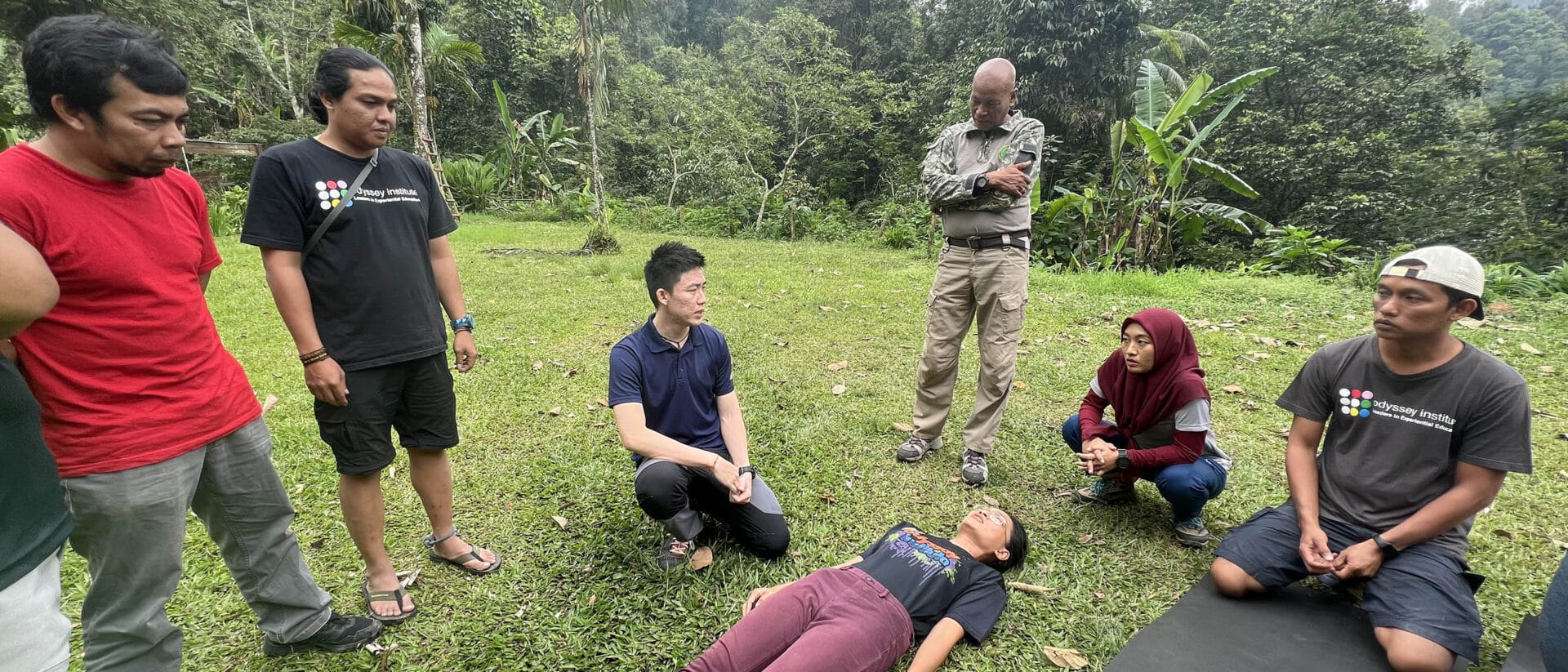
Wilderness First Aid
Introduction to essential medical response skills
An intensive two-day introduction to essential concepts and skills in emergency medicine and first aid for remote and outdoor settings. The course covers the basics of patient assessment, basic life support including CPR, environmental emergencies, backcountry medical problems, and treatment of fractures, wounds, and more.
Recommended for those in outdoor, rural, disaster response or similar settings, but where access to advanced care is not highly delayed.
Course Overview
Wilderness First Aid
Course # 251102
Dates
November 16 –
November 17
Course Length
2 days
Location
Yellow Springs, Ohio USA
Notes
Coffee and tea provided. Tenting extra.
Course host
Glen Helen Outdoor Education Center
Registration deadline
November 15
Cost
USD 123.45
Language
English
Certification
Wilderness First Aid
Course Description
The Wilderness First Aid curriculum is written by a team of remote medical rescue researchers and professionals. Ongoing evidence based research and review contributes to a unique and innovative approach to patient care in backcountry and austere settings. The curriculum is comprehensive, complete, and kept current on an annual basis.
- Wilderness Protocols including wound cleaning and exploration, and anaphylaxis.
- General Principles of Wilderness and Rescue Medicine with an emphasis on the prevention and identification of medical emergencies, appropriate technology, and risk management.
- Basic life support: circulatory system, nervous system, respiratory system.
- Patient assessment and emergency care including CPR and the emergency treatment of anaphylaxis.
- Environmental Medicine including hypothermia and heat illness, lightning, and submersion.
- Backcountry Medicine including the assessment and treatment of common medical problems, and improvised patient carries.
- Musculoskeletal Problems including unstable and stable injuries.
- Wound management including open fractures, lacerations, burns and blisters.
- Practical skills including splinting and bandaging.
Recertification
Certifications are valid for three years. Learners may retake the WFA course to recertify. Graduates may also consider upgrading to the Wilderness Advanced First Aid and or Wilderness First Responder level of certification.
Contact us more information about recertification options.
Materials Provided
All teaching materials will be at no additional cost. Learners will receive the following books on this course:
- Wilderness First Aid Guide
- SOAP Notebook
- Wilderness and Rescue Medicine textbook
Evaluation
Successful completion with certification is based on 100 percent attendance, satisfactory performance on homework assignments and written quizzes, demonstrated proficiency with practical skills, and a successful grade on a final written exam. Viristar is committed to making reasonable accommodation to any learner with special needs.
Certifications
Upon successful course completion, learners will receive certification in Wilderness First Aid and Adult CPR (based on ILCOR/AHA standards).
Certifications are valid for three years.
Prerequisites
Learners must be at least 16 years old to participate in this course. Those under 18 years of age require the written consent of a guardian or parent.
Syllabus
Download Full syllabusTopics
Day 1
Welcome, registration, introduction
General Principles
Patient Assessment System
Basic Life Support & Adult CPR
Circulatory System
Respiratory System
Nervous System
Long Bone, Joint & Stable Musculoskeletal Injuries
Extremities Splinting
Day 2
Medical-Legal
Anaphylaxis
Improvised Patient Carries
Environmental Medicine: Thermoregulation, Submersion Injury, Lightning/Electrical Injury
Wounds & Burns
Lifting, Moving & Extrication
Backcountry Medicine
Testing, Conclusion
Instructor
Course Description
The Wilderness First Aid curriculum is written by a team of remote medical rescue researchers and professionals. Ongoing evidence based research and review contributes to a unique and innovative approach to patient care in backcountry and austere settings. The curriculum is comprehensive, complete, and kept current on an annual basis.
- Wilderness Protocols including wound cleaning and exploration, and anaphylaxis.
- General Principles of Wilderness and Rescue Medicine with an emphasis on the prevention and identification of medical emergencies, appropriate technology, and risk management.
- Basic life support: circulatory system, nervous system, respiratory system.
- Patient assessment and emergency care including CPR and the emergency treatment of anaphylaxis.
- Environmental Medicine including hypothermia and heat illness, lightning, and submersion.
- Backcountry Medicine including the assessment and treatment of common medical problems, and improvised patient carries.
- Musculoskeletal Problems including unstable and stable injuries.
- Wound management including open fractures, lacerations, burns and blisters.
- Practical skills including splinting and bandaging.
Recertification
Certifications are valid for three years. Learners may retake the WFA course to recertify. Graduates may also consider upgrading to the Wilderness Advanced First Aid and or Wilderness First Responder level of certification.
Contact us more information about recertification options.
Materials Provided
All teaching materials will be at no additional cost. Learners will receive the following books on this course:
- Wilderness First Aid Guide
- SOAP Notebook
- Wilderness and Rescue Medicine textbook
Evaluation
Successful completion with certification is based on 100 percent attendance, satisfactory performance on homework assignments and written quizzes, demonstrated proficiency with practical skills, and a successful grade on a final written exam. Viristar is committed to making reasonable accommodation to any learner with special needs.
Certifications
Upon successful course completion, learners will receive certification in Wilderness First Aid and Adult CPR (based on ILCOR/AHA standards).
Certifications are valid for three years.
Prerequisites
Learners must be at least 16 years old to participate in this course. Those under 18 years of age require the written consent of a guardian or parent.
Syllabus
Download Full syllabusTopics
Day 1
Welcome, registration, introduction
General Principles
Patient Assessment System
Basic Life Support & Adult CPR
Circulatory System
Respiratory System
Nervous System
Long Bone, Joint & Stable Musculoskeletal Injuries
Extremities Splinting
Day 2
Medical-Legal
Anaphylaxis
Improvised Patient Carries
Environmental Medicine: Thermoregulation, Submersion Injury, Lightning/Electrical Injury
Wounds & Burns
Lifting, Moving & Extrication
Backcountry Medicine
Testing, Conclusion
